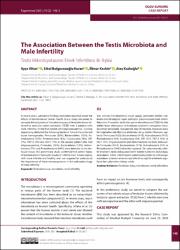| dc.contributor.author | Altun, Ayşe | |
| dc.contributor.author | Bulgurcuoğlu Kuran, Sibel | |
| dc.contributor.author | Keskin, İlknur | |
| dc.contributor.author | Kadıoğlu, Ateş | |
| dc.date.accessioned | 2021-12-20T07:16:00Z | |
| dc.date.available | 2021-12-20T07:16:00Z | |
| dc.date.issued | 2021 | en_US |
| dc.identifier.citation | Altun, A., Bulgurcuoğlu Kuran, S., Keskin, İ. ve Kadıoğlu, A. (2021). The association between the testis microbiota and male infertility. Experimed, 11(2), 140-142. https://dx.doi.org/10.26650/experimed.2021.955321 | en_US |
| dc.identifier.issn | 2630-6050 | |
| dc.identifier.uri | https://dx.doi.org/10.26650/experimed.2021.955321 | |
| dc.identifier.uri | https://hdl.handle.net/20.500.12511/8696 | |
| dc.description.abstract | In recent years, substantial findings have been reported about the effects of microbiota on human health. In our study, we aimed to compare the outcomes of microbiota assays of testicular tissue obtained by testicular sperm extraction (TESE) from 2 patients with male infertility. In the first patient who had azoospermia, Illumina sequencing detected the following bacterial flora in the collected tissue homogenates: Firmicutes (53%), Bacteroidetes (12%), Actinobacteria (12%), Proteobacteria (8%), Fusobacteria (8%), SR1 (7%), TM7-3 (3%) and OD-1 (1%). In the second patient who had oligozoospermia, Firmicutes (13%), Bacteroidetes (15%), Actinobacteria (7%) and Proteobacteria (64%) were detected in the testicular tissue. Our preliminary study confirmed that certain types of bacteria exist in testicular tissues of infertile men. Future studies with more infertile and healthy men are required to understand the importance of these microorganisms in the pathophysiology of male infertility. | en_US |
| dc.description.abstract | Son yıllarda mikrobiyotanın insan sağlığı üzerindeki etkileri hakkında önemli bulgular rapor edilmiştir. Çalışmamızda erkek infertilitesi olan 2 hastadan testiküler sperm ekstraksiyonu (TESE) ile elde edilen testis dokusunun mikrobiyota analizinin sonuçlarını karşılaştırmayı amaçladık. Azospermik olan ilk hastada, toplanan doku homojenatlarında Illumina dizilemesi ile şu bakteri florasına saptandı: Firmicutes (%53), Bacteroidetes (%12), Actinobacteria (%12), Proteobacteria (%8), Fusobacteria (%8), SR1 (%7), TM7-3 (%3) ve OD-1 (%1). Oligozoospermi olan ikinci hastanın ise testis dokusunda Firmicutes (%13), Bacteroidetes (%15), Actinobacteria (%7) ve Proteobacteria (%64) bakterileri saptandı. Ön çalışmamızda, infertil erkeklerin testis dokusunda belirli bakteri türlerinin bulunduğu doğrulandı. Erkek infertilitesinin patofizyolojisinde bu mikroorganizmaların önemini anlamak için infertil ve sağlıklı erkeklerle yapılacak ileri çalışmalara ihtiyaç vardır. | en_US |
| dc.language.iso | eng | en_US |
| dc.publisher | AVES | en_US |
| dc.rights | info:eu-repo/semantics/openAccess | en_US |
| dc.rights | Attribution-NonCommercial 4.0 International | * |
| dc.rights.uri | https://creativecommons.org/licenses/by-nc/4.0/ | * |
| dc.subject | Testicular Tissue | en_US |
| dc.subject | Microbiota | en_US |
| dc.subject | Male Infertility | en_US |
| dc.subject | Testiküler Doku | en_US |
| dc.subject | Mikrobiyota | en_US |
| dc.subject | Erkek İnfertilitesi | en_US |
| dc.title | The association between the testis microbiota and male infertility | en_US |
| dc.title.alternative | Testis mikrobiyotasının erkek infertilitesi ile ilişkisi | en_US |
| dc.type | other | en_US |
| dc.relation.ispartof | Experimed | en_US |
| dc.department | İstanbul Medipol Üniversitesi, Tıp Fakültesi, Temel Tıp Bilimleri Bölümü, Histoloji ve Embriyoloji Ana Bilim Dalı | en_US |
| dc.authorid | 0000-0002-7059-1884 | en_US |
| dc.identifier.volume | 11 | en_US |
| dc.identifier.issue | 2 | en_US |
| dc.identifier.startpage | 140 | en_US |
| dc.identifier.endpage | 142 | en_US |
| dc.relation.publicationcategory | Diğer | en_US |
| dc.identifier.doi | 10.26650/experimed.2021.955321 | en_US |



















